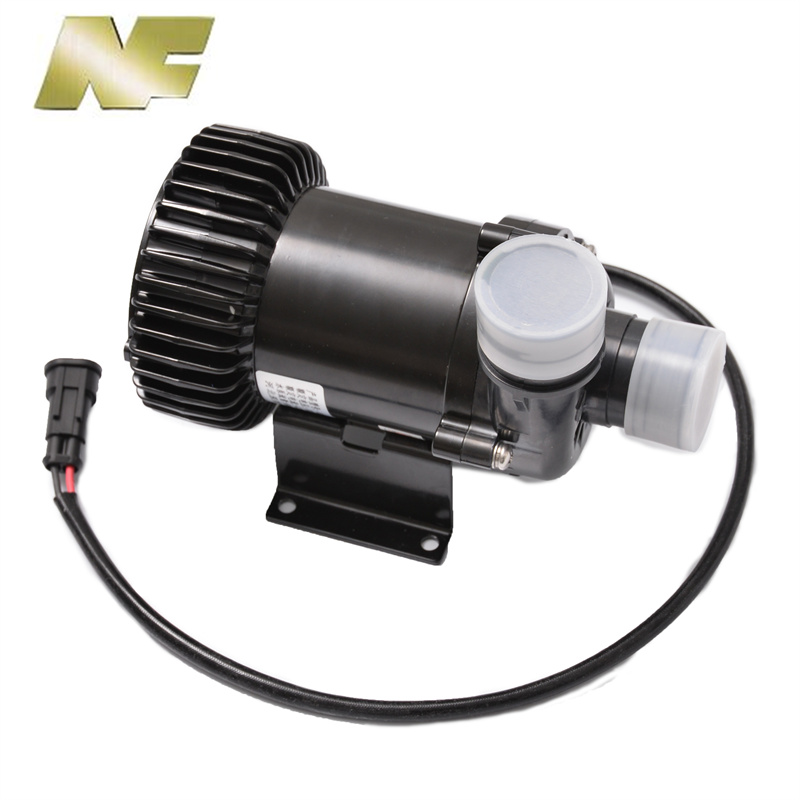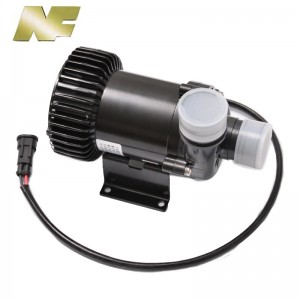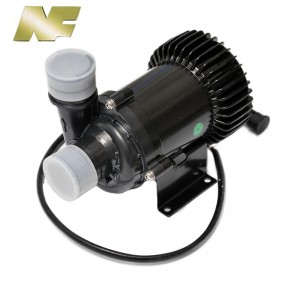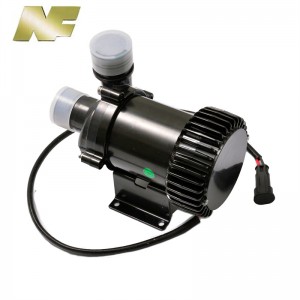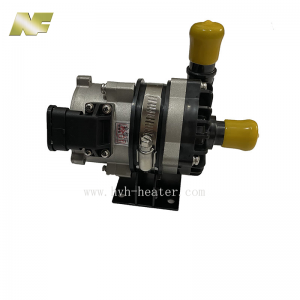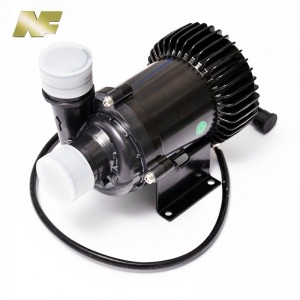NF Auto Electric Water Pump For Bus
Description
With the widespread adoption of electric vehicles, there has been a surge in demand for high-quality, efficient water pumps for automotive and electric bus applications. Whether cooling the engine or managing vehicle temperature, a reliable water pump is critical to the smooth operation of any vehicle.
12V electric water pump overview:
12V electric water pumps are a staple in the automotive industry due to their versatility and efficiency. These pumps are designed to provide adequate water circulation, ensuring optimum engine temperature. By effectively controlling engine temperature, the risk of overheating and subsequent engine damage is greatly reduced. In addition, these pumps are compact, lightweight and affordable, making them ideal for small and medium-sized vehicles.
Electric bus water pump:
As an environmentally friendly alternative to traditional buses, electric buses are rapidly gaining attention around the world. However, its unique electrical requirements require specialized pumping systems to ensure efficient operation. The water pumps of electric buses are specially designed to meet higher voltage requirements, usually 24V DC. Since the electric bus runs on battery packs, a 24V DC automatic water pump is the perfect match to keep the cooling system performing consistently while maximizing energy efficiency.
Technical Parameter
|
Ambient temperature
|
-50~+125ºC
|
|
Rated Voltage
|
DC24V/12V |
|
Voltage Range
|
DC18V~DC32V |
|
Waterproofing Grade
|
IP68 |
|
Current
|
≤10A
|
|
Noise
|
≤60dB
|
|
Flowing
|
Q≥6000L/H (when the head is 6m)
|
|
Service life
|
≥20000h
|
|
Pump life
|
≥20000 hours
|
Advantage
Advantages of car water pump 24V DC:
1. Increased Efficiency: Automotive water pumps operating at 24V DC can significantly increase efficiency compared to their lower voltage counterparts. By using the correct voltage for your vehicle, these pumps ensure optimal power consumption and reduce energy waste.
2. Robust performance: 24V DC pump designed to meet the demanding requirements of automotive and electric bus applications. They provide reliable and consistent water circulation to prevent any potential engine problems due to overheating.
3. Improve safety: 24V DC car water pump has high voltage efficiency, which can reduce the risk of voltage drop or abnormality during operation, providing a safer choice. This ensures that the pumping system works at optimal capacity, maximizing safety and performance.
4. Compatibility: Due to the increasing popularity of 24V DC systems, there is a range of compatible components and accessories on the market. This allows for seamless integration and ensures easy replacement or upgrade if necessary.
Application
Hybrid electric vehicles (HEVs) are receiving increasing attention in the automotive industry for their ability to reduce fuel consumption and dependence on fossil fuels. With the growing demand for sustainable mobility solutions, hybrid vehicles have become a popular choice for environmentally conscious consumers. However, the success of these vehicles relies on the integration of various technologies, and one key component that plays an important role is the water pump.
Traditionally, internal combustion engines employ a mechanically driven water pump to cool the engine and prevent overheating. This approach has proven to be effective, but not the most energy efficient. In contrast, hybrid vehicles utilize an electronic water pump driven by an electric motor, which offers several advantages.
One of the main advantages of electronic water pumps in hybrid vehicles is their ability to operate independently of engine speed. Unlike its mechanically-driven counterparts, the electronic water pump can adjust its speed according to the cooling needs of the vehicle, reducing energy consumption and increasing efficiency. By precisely controlling water flow, these pumps help maintain the engine's optimum operating temperature, resulting in better performance and longer engine life.
Additionally, electronic water pumps in HEVs help improve overall fuel efficiency. By eliminating the power loss associated with mechanical water pumps, these innovative pumps can redirect energy back into the engine, hybrid system, and even charge the battery. This regeneration process enhances the vehicle's fuel economy potential, reduces emissions and reduces its carbon footprint.
To ensure the smooth operation of electronic water pumps in hybrid vehicles, manufacturers integrate advanced control systems. These systems monitor coolant temperature and adjust pump speed accordingly in real time, ensuring optimal cooling performance while reducing unnecessary energy consumption. In addition, the control system features built-in protection mechanisms to prevent damage due to overheating or accidental failure.
The adoption of electronic water pumps in hybrid vehicles represents an important step towards building a more sustainable transportation future. Its energy-efficient design not only helps reduce greenhouse gas emissions, but also aligns with global efforts to combat climate change. As governments around the world push for stricter emissions regulations, hybrid vehicles equipped with electronic water pumps will play a key role in meeting these requirements and enabling a greener automotive landscape.
Additionally, the integration of electronic water pumps in hybrid vehicles highlights the continued innovation and technological advancements in the automotive industry. Manufacturers are constantly exploring and implementing environmentally friendly solutions to improve vehicle performance and efficiency. The development of the e-water pump demonstrates a collaborative effort between engineers, researchers and automakers to create cutting-edge technology that benefits consumers and the environment.
In conclusion, the integration of electronic water pumps in HEVs marks an important milestone in the automotive industry. These pumps improve efficiency, fuel economy and reduce emissions. In addition to the environmental benefits, the electronic water pump improves the overall performance and life of the engine. With the growing demand for sustainable mobility, hybrid vehicles equipped with electronic water pumps are proving to be a promising solution to enable a greener future on our roads.

FAQ
Q: What is a car electric water pump for buses?
Answer: The passenger car electric water pump is a device used to circulate the coolant in the passenger car engine cooling system. It runs on an electric motor, which helps keep the engine at an optimum temperature.
Q: How does the car electric water pump work?
A: The car's electric water pump is connected to the engine's cooling system and is powered by the vehicle's electrical system. After starting, the electric motor drives the impeller to circulate the coolant to ensure that the coolant flows through the radiator and engine block to effectively dissipate heat and prevent overheating.
Q: Why are electric water pumps for cars important for buses?
A: An automotive electric water pump is critical for buses as it helps maintain proper engine temperature, which is critical for reliable and efficient performance. It prevents the engine from overheating, reduces the risk of engine damage and ensures the longevity of the vehicle.
Q: Does the car's electric water pump show signs of trouble?
A: Yes, some common signs of a car electric water pump failure include engine overheating, coolant leaks, unusual noise from the pump, and obvious damage or corrosion to the pump itself. If you notice any of these symptoms, it is recommended to have the pump checked and replaced if necessary.
Q: How long can a car electric water pump usually last?
Answer: The service life of the electric water pump of the car will vary due to factors such as the use, maintenance and quality of the water pump. On average, a well-maintained pump will last 50,000 to 100,000 miles or more. However, regular inspection and replacement (if necessary) is essential to ensure optimum performance.
Q: Can I install a car electric water pump on the bus myself?
A: While it is technically possible to install an automotive electric water pump on a bus yourself, it is highly recommended to seek professional help. Proper installation is critical to pump performance and life, and professional mechanics have the expertise and tools needed for a successful installation.
Q: How much does it cost to replace the car's electric water pump with a bus?
A: The cost of replacing an automotive electric water pump for a bus can vary depending on the make and model of the vehicle and the quality of the pump. On average, the cost ranges from $200 to $500, including the pump itself and installation labor.
Q: Can I use a manual water pump instead of an automatic electric water pump?
A: In most cases, it is not recommended to replace an automatic electric water pump with a manual water pump. The automatic electric water pump runs more efficiently, is easier to control, and provides better cooling. Additionally, modern passenger car engines are designed to work with the car's electric water pump, replacing it with a manual water pump could compromise engine performance.
Q: Are there any maintenance tips for car electric water pumps?
A: Yes, some maintenance tips for your car's electric water pump include regularly checking the coolant level, checking for leaks or damage, ensuring proper tension and alignment of the pump belt, and following the manufacturer's recommended maintenance schedule. Also, it is important to replace the pump and other cooling system components at specified intervals to avoid any potential problems.
Q: Will the failure of the car's electric water pump affect other parts of the engine?
A: Yes, a car electric water pump failure can have a major impact on other engine components. If the pump isn't circulating the coolant properly, it can cause the engine to overheat, which can lead to damage to the cylinder head, gaskets, and other critical engine components. That's why it's crucial to fix water pump problems promptly to prevent further damage.

